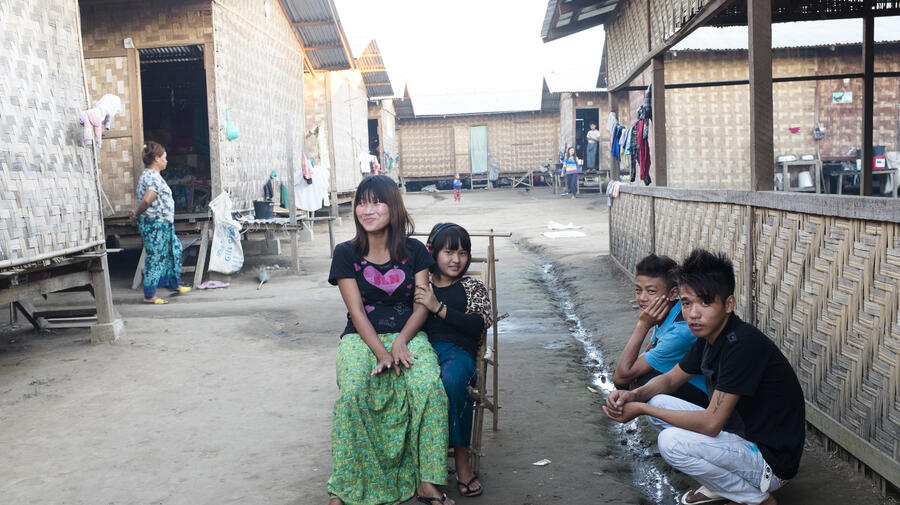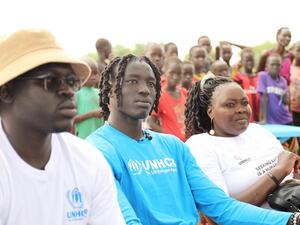Kachins chat about the challenges of displacement over the air waves
Kachins chat about the challenges of displacement over the air waves

Internally displaced Kachin teenagers at a camp in Myitkyina, Myanmar.
MYITKYINA, Myanmar, May 29 (UNHCR) - An engineer checks the sound level on his tape recorder. "Ti, ni, toe, lee (one, two, three, four)," he counts in Burmese as a colleague takes notes. A third member of the team chats to the audience as they get ready for an outside broadcast in north-east Myanmar of "Bright Young Stars," a popular British-funded youth radio programme.
With an estimated audience of 8.9 million, the weekly programme on the BBC's Burmese service, has enormous reach in a country where many people rely on radio for information. It explores youth issues, spreads awareness and information, sparks debate and provides young people with a national voice.
Today, the show is being aired from a camp for internally displaced people in the northern town of Myitkyina, capital of restive Kachin state. "We wanted to hear how young people live in a situation of displacement," said Suu Myat, lead producer on the programme, which is co-produced by BBC Media Action and the BBC's Burmese service. "We know that conflict has been going on for a long time in Kachin, but what does this mean to young people like us?," she adds.
It's a subject that gets relatively little coverage in Myanmar, but more than 100,000 people have been uprooted from their homes in Kachin state since a 17-year ceasefire agreement broke down and fighting resumed between the Kachin Independence Organization and government troops in June 2011.
With the help of UNHCR and local aid organizations in Kachin, the Bright Young Stars reporters met and won the trust of young residents of the Sitarpu and Kyar Mai Kaung IDP camps in Myitkyina.
"When we listen to the radio it's mainly for the music. We rarely listen to the discussions or news," explained one 17-year-old Kachin, Lum Zawng, who has been living in the camp for almost four years. Most broadcasts, moreover, are in Burmese.
Suu Myat explained that when planning for a show, "We always try to have this in mind - that the show will be driven by the audience as much as possible." And once they understood what was going on, young people in the camp joined in enthusiastically, talking about their daily life and sharing opinions on a wide variety of issues.
Some expressed fears about the future. With a move towards a nationwide ceasefire agreement and elections planned for the end of the year, there are plenty of unknowns for them. "For now, I feel hopeless after all this fighting," said one Kachin, adding: "Despite living with my family, I can't have a free life until there is peace."
The conflict and displacement have left both physical and emotional scars. Many told the reporters their biggest fear was that young people might turn to negative coping mechanisms such as drugs and alcohol, or fall victim to people trafficking - especially vulnerable women and girls.
There is also a great sense of solidarity in the camps, which came across in the show. "We are short of teachers here," said Naw Aum, who is volunteering as a teacher. "If they [young people in the camps] don't have an education, they will end up working for others on a daily wage. I'd like them to have an ambition."
For some this ambition is clear: "When I'm older, I want to become a doctor. Then, I will give health care to sick and poor people and I will help sad people to feel happy," said 13-year-old Htel San.
By Medea Savary in Myitkina, Myanmar








